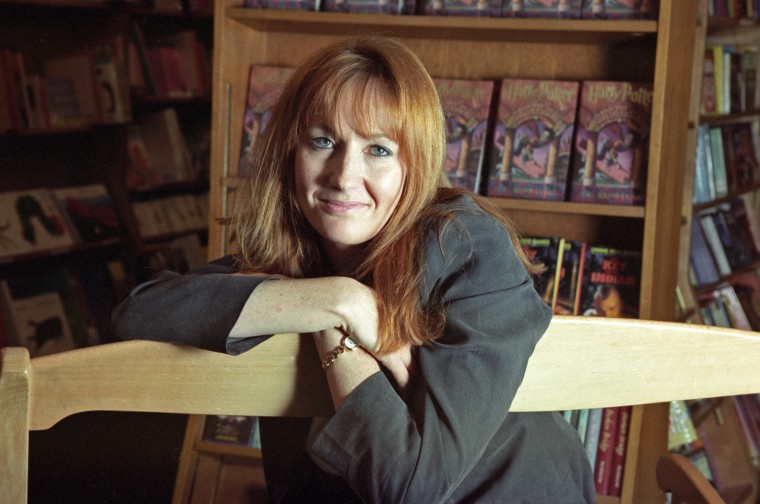J.K. Rowling has let us down. On Sunday, the internationally renowned author tweeted, again, transphobic comments. Despite a swift backlash, she doubled down on her statements three days later in a lengthy post on her website that emphasized her belief that trans women aren’t women.
The “Harry Potter” author has chosen to use her enormous platform (during Pride Month, no less) to spread exclusionary and factually incorrect views about the trans community.
Upon reading Rowling’s posts, my first response was anger. The “Harry Potter” author has chosen to use her enormous platform (during Pride Month, no less) to spread exclusionary and factually incorrect views about the trans community, seemingly without regard for the lives her falsehoods were inevitably putting in danger.
But after my blood pressure settled (and my donation to an LGBTQ-rights organization was sent), I found myself driven to action. Because at the heart of every one of Rowling’s beloved books is a belief system and worldview seemingly in direct opposition to her current personal beliefs.
Like many of my millennial peers, I grew up devouring every new story about The Boy Who Lived as fast as I could read them. At age 8, I dressed as Hermione for Halloween; at 11, I drafted up my own Hogwarts acceptance letter; at 13, I had my parents ship the final book to me at sleep-away camp, so I wouldn’t have the ending spoiled by my friends back home. Even now, as an adult, I visit Florida’s Harry Potter World on a regular basis and reread the series at least once a year. The stories offer a lovely nostalgia, yes. But amid a reality that is depressingly oppressive, what draws me most is their themes and takeaways: the value of friendship, the power of facing your fears and, notably, the dangers of prejudice.
All throughout the series, Harry and his friends call out discrimination and fight for the rights of others. They bond with stigmatized half-giants and werewolves, discredit the myths around “pureblood” wizards, and, in Hermione’s case, advocate for the welfare of poorly treated house elves, even when no one else seems to care. The books’ metaphors aren’t subtle; race and sexuality may not be factors in the magical world, but hate and judgment sure are. Often, the teens’ allyship or concerns are dismissed by the series’ crueler adults, characters unable to see through their own biases. Still, the trio continues on, sending a clear message to Potter readers that true heroes are the people who stand up for others no matter the cost.
Want more articles like this? Follow THINK on Instagram to get updates on the week's most important cultural analysis
And for countless fans like myself, that message has shaped our lives as much as the novels themselves. While we all undoubtedly have work to do when it comes to our allyship and activism, our baseline — that we should celebrate the diversity of the world and fight prejudice whenever we see it — is upright. It’s what Dumbledore would do, after all, or Hermione, or Luna. It’s what’s necessary in order to ensure equality for all, and, more simply, it’s what’s good.
Over the past several months, the author has consistently demonstrated that she doesn’t emulate the themes of her own books.
And it’s also, apparently, in contradiction with Rowling’s beliefs. Over the past several months, the author has consistently demonstrated that she doesn’t emulate the themes of her own books. If she truly believed in equality, why would she repeatedly separate “trans women” and “women” as distinct groups? If she actually wants to uplift minorities, why would she publicly defend a researcher who was let go over using offensive anti-trans language, as she did in 2019? If she genuinely empathized with trans people’s struggles, why does she spend more time questioning their existence than advocating for their rights and donating to LGBTQ causes?
It’s enraging to realize that Rowling isn’t the person we long assumed she was. More and more, we’re forced to reckon with creators who betray our trust, often painfully, and Rowling now joins a long list of those who have sullied works adored by millions. Separating the art from the artist is rarely easy, and it is similarly difficult here. We have to decide if it’s even worth separating — and I understand why, for many, there is no way successfully to do so.
“Here I am, a person who once revered Rowling, a person who is also in the community that she invalidated with a few careless tweets,” wrote NPR producer Mallory Yu on June 10. “It's more than a little disappointing that the woman who created a wizarding world that meant everything to me doesn't care to include me or my community.”
Clearly, Rowling’s words are crushing, in ways that a straight cisgender person like myself cannot understand. But what I hope my fellow Potter fans remember is that, as Daniel Radcliffe said so eloquently in his response to the author’s tweets, it’s the values preached in the series that hold weight, not Rowling. Especially now, so many years after her books were first published. If the series taught you to be more empathetic toward others, or if it encouraged you to call out discrimination, or if it educated you on the plights of the oppressed — that is a good thing. But more important is what we do with those lessons.
“Harry Potter,” after all, doesn’t have to be just about Rowling; it can be about us, the readers, who have taken its lessons and used them to make the real world a better place. Whether she meant to or not, Rowling created an army of young people around the world who would grow up in direct opposition to her own hateful transphobia. Let’s not let her forget it.
Related:


